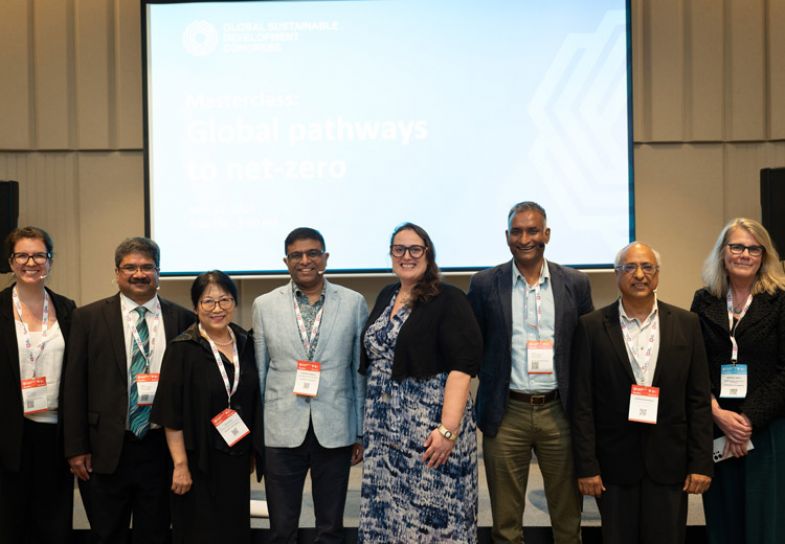
Source:
THE Events

At the University of Alberta, sustainable research is exploring collaborative approaches to suit the needs of the local and global communities
As part of a global community, post-secondary institutions must actively participate in and contribute to achieving the UN’s Sustainable Development Goals (SDGs). The University of Alberta is deeply committed to innovative research, scholarship and education in this area. At a panel, held in partnership with the university, during the 2024 THE Global Sustainable Development Congress, academics and experts spoke about the exciting and innovative pathways to net zero currently being pursued.
“Achieving ambitious sustainability goals requires a collaborative approach across multiple levels,” said Cen Huang, vice-provost and associate vice-president of international at the University of Alberta. “Pursuing net zero is not just an ambitious target. However, it is vital for our planet’s survival and the well-being of future generations.”
Cathy Hardman, political counsellor at the Embassy of Canada in Thailand, spoke about how climate change is a global challenge that requires global solutions and shared examples of the collaborative approach necessary to combat the crisis.
Contextualising this global challenge, Shobhakar Dhakal, professor of energy and climate policy at the Asian Institute of Technology, started the panel discussion by examining some of the different terms that are frequently used in conversations like this.
“One of the serious concerns for the climate agenda is the emission of greenhouse gases,” Dhakal said. “The issues of carbon neutrality and net zero are discussed all the time here. To clarify, decarbonisation means essentially removing carbon dioxide from our activities, say, in the energy system. Carbon neutrality means carbon dioxide emission neutrality – reducing emissions but also sequestering carbon from the atmosphere. Net zero greenhouse gas emissions also opens up the box to include more gases – not just carbon dioxide.”
Energy transition was another concept that came up during the discussion. The panel said that many countries find themselves at different stages of this, which has implications for cost and pathways. “The challenges for developing countries pursuing green energy transitions will be different from those experienced by developed countries,” said Ashish Garg, professor in the Department of Sustainable Energy Engineering at the Indian Institute of Technology Kanpur. “A lot of India’s electricity, for example, comes from coal. A lot of Thailand’s comes from natural gas,” said Garg. “These are aspiring developing economies. Their economic progress will not come without meeting energy needs. How do you get this energy at low cost, reliably and at scale?”
Given that achieving net zero presents challenges for various markets, it’s important for countries to explore the broad basket of options available to them as they look to decarbonise. “Typically, I place these net zero options into three baskets,” said Amit Kumar, professor in the Faculty of Engineering and Canada research chair in assessment of energy systems (tier 1) at the University of Alberta. “The first is energy efficiency, improving the way you use energy. The second basket contains renewables. And the third one I see as carbon capture and storage.”
Within Kumar’s basket of options, there are many nuances, methodologies and technologies worth exploring, demonstrating the numerous possibilities open to countries looking to decarbonise. This is also true as you move from global solutions to more local ones.
“So far, you’ve heard a lot about technology, but it’s us who are consuming energy,” said Sandeep Agrawal, associate dean and professor at the School of Urban and Regional Planning at the University of Alberta. “Cities and towns are key here, especially those in high latitudes. Cities at the 50th parallel north and further up experience greater temperature extremes than those outside it,” said Agrawal. “Community-based, grassroots strategies and bottom-up actions are essential for these cities, as well as for regions around the world.”
The panel:
- Sandeep Agrawal, associate dean and professor, School of Urban and Regional Planning, University of Alberta
- Shobhakar Dhakal, professor of energy and climate policy, Asian Institute of Technology
- Ashish Garg, professor, Department of Sustainable Energy Engineering, Indian Institute of Technology Kanpur
- Cathy Hardman, political counsellor, Embassy of Canada, Thailand
- Cen Huang, vice-provost and associate vice-president of international, University of Alberta
- Amit Kumar, professor in the Faculty of Engineering and Canada research chair in assessment of energy systems (tier 1), University of Alberta
- Maja Osmanagic, operations director, Office of the Sustainability Council, University of Alberta (chair)
Find out more about the University of Alberta.
